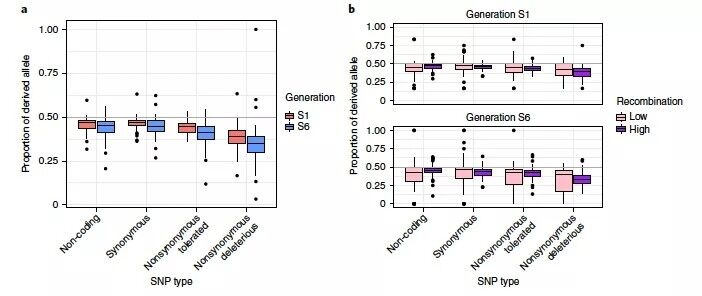Recently, Professor Qingpo Liufromthe College ofAgricultural and Food Sciences and Professor Brandon S. Gaut from the Department of Ecology and Evolutionary Biology, University of California, Irvine, USA, have made important progress in the research on the evolutionary mechanism of maize genome. The research results are entitled "The genome-wide dynamics of purging during selfing in maize" in Nature Plants (journal impact factor 13.297 in 2018). ). Liu Qingpo and Brandon S. Gaut are Correspondent authors.

Using six inbred lines from 11 local breeds, the team explored the dynamics ofcorngenome-wide genetic clearance during self-crossing.Studies have found that heterozygous harmful single nucleotide polymorphic locusare more likely togetlost from the genome duringcorn selfing.In regions of high recombination chromosomal sequences, recombination can result in uncoupling with linked variant sites to increase selection efficiency, resulting in faster rates of dSNPs loss.However, the actual rate of loss of heterozygosity in maize (35-40%/generation) is slower than expected (50%/generation), which may reflect thepervasive associative overdominance. The study also found thatthree lines exhibited marked decreases in genome size due to the purging of transposable elements.Theselines purged an average of 398 Mb from their genomes, an amount equivalent to threeArabidopsis thalianagenomes per lineage, in only a few generations.Genome loss was more likely to occur for lineages that began with larger genomes with more transposable elements and chromosomal knobs, the greater thr likelihood of the genomic sequence loss.

During evolution, rapid changes generallytake place in the genomes of plants and animals, in a certain generation whereas the causes which resulted in this phenomenon vary.
The main differences between the genomes of self-crossing and hybridizationNematode are mainly caused by the loss of DNA sequences ortransposable elementsin approximateproportions or transposable elements.Whereas, the loss of crop genome sequences is probably the latent consequencesof the alteredway of reproductionchangingfrom self-pollination to cross-pollination.
Thisresearchis of great significance thatit gives us abetter understanding ofplants genomes evolution, particularly in theinternalmechanism ofselectiveclearanceincludingharmfulmutationsandrepeatsequences inplantself-pollination.Nature Plants(ISSN 2055-026X;eISSN2055-0278)is anworldwiderenowned academic journal andis one of thesub-journalof thetopcademic journal,Nature,whichfocuses on the publication of various original scientific research results in the field of botonyandthescopeofappliedscience, as well as themutualrelationship between human and plant communities.